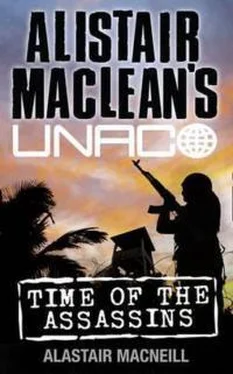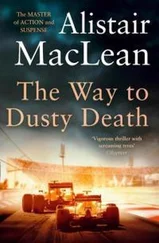‘Are you married, Clarence?’ Mobuto asked from the back seat. ‘I suddenly realized I don’t know anything about you since you left Oxford.’
Whitlock wished Mobuto would stop calling him Clarence. But there was nothing he could do about it.
Mobuto had already reported him to Kolchinsky for calling him Jamel at the airport. Kolchinsky had hauled him into the office the next day and told him to bite his tongue. Mobuto was a guest in the country, and an important one at that. Kolchinsky had also pointed out that it wasn’t as if he were insulting him. He was only calling him by his name. Whitlock knew he was right. Clarence indeed!
‘Yes, I’ve been married for seven years. Actually, my wife works in Harlem.’
‘Really? What does she do?’
‘She’s a paediatrician.’
‘How interesting,’ Mobuto said without sounding particularly convincing. ‘Do you have any children?’
‘No.’
The silence descended again.
‘We’re in Harlem now,’ Whitlock said as the Mercedes followed the police car into Lenox Avenue.
Mobuto peered through the dark glass window. ‘It seems so bleak and depressing.’
‘It is, believe me. Poverty’s rife because unemployment’s so high. So youngsters turn to drugs, crime and prostitution to make ends meet. It’s hard to believe this is America, land of the free.’
‘I’d like to speak to some of the people,’ Mobuto said, the pained expression etched on his face. ‘Driver, pull over.’
The driver shot Whitlock a nervous glance but Whitlock shook his head.
‘We’re not stopping, not until we reach the school.’
‘Why not?’ Mobuto demanded. ‘These are your people as well, Clarence.’
‘We may be black, sir, but we don’t belong here. They don’t like outsiders. And can you blame them, looking around at all the squalor? This is what a succession of American governments have done for them. It makes me bitter when I come into Harlem. But they don’t want my sympathy. They don’t want anybody’s sympathy. They just want to be left alone to try and sort out their own problems.’ Whitlock glanced at Mobuto in the rear-view mirror. ‘Don’t think it was easy getting you into Harlem; it wasn’t. The government had to negotiate with community leaders to let the convoy enter. We’re driving through some gang’s turf right now. We’re violating their space. If our visit hadn’t been sanctioned by the community leaders the convoy would certainly have come under attack by now.’
‘But surely the police cars would deter them?’
A faint smile touched the driver’s lips.
‘The gangs don’t fear the police,’ Whitlock said. ‘If anything, it’s the other way round. You may have noticed that all the uniformed policemen in the convoy are black. They’re all based here in Harlem. The people know them.’
Mobuto fell silent.
The large crowd of onlookers which had congregated outside the school was being kept away from the main gates by a cordon of policemen. Some were genuinely interested in the man, others attracted by the media hype that had surrounded his visit since the attempt on his life two days earlier. The schoolchildren, who lined the approach road to the school, had been issued with small replicas of the Zimbalan flag and they began to wave them on cue the moment the cavalcade came into sight.
Mobuto smiled and waved as the car passed them. Whitlock ignored the children. His eyes were on the surrounding buildings. He could see the SWAT snipers on the roofs, their faces shaded from the overhead sun by their black peaked caps. He had given instructions that all buildings be searched and guarded within a seven-hundred-yard radius of the school. He knew it had already caused a lot of resentment amongst the occupants, especially as the SWAT team was predominantly white, but there was nothing he could do about it. His first duty was to protect Mobuto.
The Mercedes followed the police car through the wrought-iron gates and pulled up behind it two hundred yards further on in front of the main portico where the principal and a deputation of community leaders were standing. Whitlock slipped in his earpiece, which kept him in touch with the leader of the SWAT team, then got out of the car and waited until Rogers and Masala had joined him from the second Mercedes before opening the door for Mobuto.
The principal stepped forward as Mobuto climbed from the car and extended his hand in greeting. He welcomed Mobuto to the school then set about introducing him to the five community leaders who had been chosen to meet him. Whitlock and Rogers exchanged anxious glances. Why couldn’t the introductions be made inside? Mobuto was a prime target on the portico. Whitlock slid on his sunglasses and scanned the roof of the adjacent building. It was guarded by two of the SWAT team. He felt the sweat run down the side of his face. Bernard had said the attempt would be made outside the school.
That was why he had already persuaded Mobuto not to get out and greet the crowd. It would be tempting fate. Which left the sniper – if, in fact, there even was one. And if Bernard were the sniper, why had he tipped off Bailey about the hit? None of it made any sense. But it wasn’t the time to be speculating about Bernard’s involvement.
He looked around once more then turned back to Mobuto who was being introduced to the last of the community leaders. He nodded to Masala who took up his position at the door, waiting to lead the deputation into the corridor, then spoke briefly to the uniformed policemen who had formed a cordon around the portico, reiterating the point he had made several times earlier at the briefing that nobody was to get past them once Mobuto was inside the building. He also told them to keep in touch with the other uniformed officers in and around the school building and to contact him if anything untoward happened, no matter how trivial. He was desperate to apprehend the assassin, or assassins, without a shot being fired. It would make amends for the lapse of security outside the hotel. Rogers touched him on the arm.
They were ready to go inside. Whitlock had been uncertain about Rogers’s presence in the hall. He would be the only white face there. It had finally been decided that he would watch the door leading off from the back of the stage. He would be hidden from view by the heavy red curtains that bordered the stage on three sides. Whitlock looked around one last time then followed Mobuto into the building.
Walter Sibele had been with the Zimbalan Security Police for eight years before it was disbanded by Jamel Mobuto, so he had jumped at the chance to join the four-man team selected to go to America to assassinate Mobuto. Massenga had told them not to view it as a revenge mission. It must be approached clinically and professionally. They had been training together for a week at a farmhouse on the outskirts of Kondese when Massenga had suddenly arrived unexpectedly with a man none of them had ever seen before. Massenga introduced him only as ‘Columbus’. There was to be a change of plan. Columbus was the new team leader, and he would kill Mobuto. They were to listen to him and obey his every instruction. They didn’t question Massenga’s orders but there was a feeling of resentment against this newcomer. He had yet to prove himself. On the second day he had thrown down the gauntlet. If any of them could beat him on the firing range, then they would not only become the new leader, but they would also win the job of killing Mobuto. It was a challenge they had readily accepted. None of them had come close to matching his shooting ability, either with handguns or rifles. That was to be the turning point. By the time the four of them had flown out to America there was nothing they wouldn’t do for him.
And now that the other two were dead, it was up to Kolwezi and himself to prove themselves to Columbus, even if it meant they would be killed in the process. They were ready for that – as long as Mobuto died with them. Then Ngune could take power and they would become the martyrs that had helped to create a new generation of power in Zimbala. And if they survived, Ngune would decorate them publicly for their bravery. Whatever the outcome, Mobuto had to die…
Читать дальше












